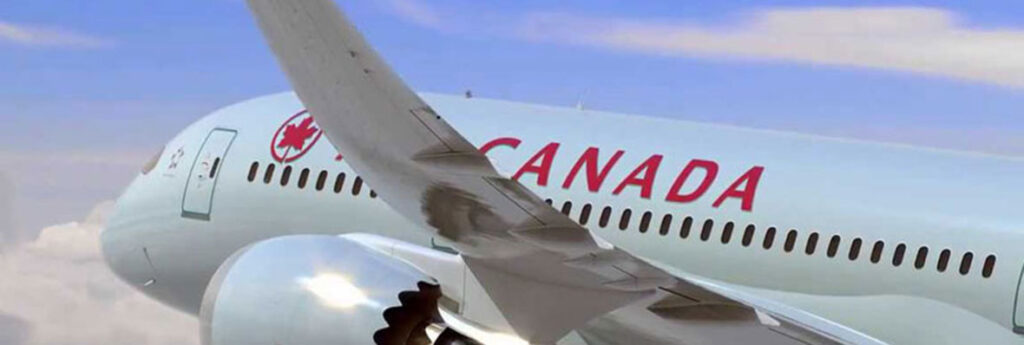Air Canada and the federal government have agreed to loans and equity financing that would allow the airline to access up to $5.879 billion in liquidity through the Large Employer Emergency Financing Facility (LEEFF) program. As part of the package Air Canada has agreed to a number of commitments, including refunds on non-refundable tickets and a promise to resume service at regional airports.
Ottawa is buying $500 million of Air Canada stock at just over $23 each and has the right to buy 14 million more. The government’s voting interest in the airline is capped at just below 20 percent.
“This will give the Canadian government a stake in the company,” Deputy Prime Minister Chrystia Freeland said. “This support comes with strict conditions to protect Canadian travellers, Canadian taxpayers and Air Canada’s workers. Air Canada workers’ jobs, pensions and collective agreements will be protected.”
Thousands of would-be passengers who paid for tickets remained in the lurch at the end of 2020 as the airline cancelled flights. Air Canada reported it held $2.3 billion in advance ticket sales during the fourth quarter.
Other restrictions imposed as part of the deal with Ottawa include a $1 million cap on executive compensation and maintaining a minimum number of staff.
Asked whether the Air Canada agreement could provide a framework for a deal with WestJet, Freeland emphasized the importance of two national carriers and characterized negotiations with the Calgary-based No. 2 airline as “constructive.”
She said ticket refunds, executive compensation and other requirements would be a factor but any deal would be based on the individual needs of the airline in question.
Travel restrictions introduced through the beginning of the pandemic have been catastrophic for the airline industry.
Air Canada’s passenger numbers declined 73% in 2020 following several years of record growth for the airline. During 2020, it reduced staff by more than 20,000, more than half of the pre-COVID total, then cut another 1,700 employees in January.
The company collected $554 million from the Canada Emergency Wage Subsidy in 2020 and said it would continue to access the program in 2021.
When the airline released its 2020 financial results in February, then-CEO Calin Rovinescu described the period as the “bleakest year in the history of commercial aviation.”
The company lost $4.6-billion in 2020, compared with a profit of $1.5 billion the year before.
Government support for Air Canada “has gone from a nice-to-have, almost to a need-to-have” said RBC analyst Walter Spracklin in a Feb. 12 note analyzing the financial results.
He added that government support would be necessary for Air Canada to provide passenger refunds because the company has been so weakened by travel restrictions it no longer has the means.
“Importantly, government assistance is required in our view to lessen the burden the Canadian airline industry will have incurred by the time the pandemic is over in order to make a viable airline industry in Canada going forward,” Spracklin said.
In early April, Air Canada pulled the plug on its planned $190-million takeover of Montreal-based tour operator Transat AT, citing Europe’s unwillingness to approve the deal, thus triggering a $12.5-million termination fee.
Organizations supporting Air Canada’s calls for a bailout have included unions such as Unifor and the Canadian Air Traffic Control Association, as well as the National Airlines Council of Canada industry group.
Michael Rousseau, President and Chief Executive Officer of Air Canada, said, “As vaccine deployments ramp up, we continue to work with the Government of Canada on the evolution of safe and science-based test and quarantine relief measures with a view to safely restarting our sector. We know that Canadians are looking forward to re-connecting with friends and family and taking those long-awaited vacations and business trips and we will be ready to safely connect Canadians within Canada and Canada to the world.”
Both ACTA and ACITA applauded the move.
“Our messages have been heard!” said a jubilant Wendy Paradis, President, ACTA. “We are very pleased that the government has heard our messages loud and clear about commission recalls – and that it has recognized the integral and important role that travel agents play in the industry.”
The federal government announced a massive relief package for Air Canada tonight that includes customer refunds, job protection, executive pay limits, and equity position in the airline and loans.
“We were also very pleased to learn in a conversation with the Ministry of Transport, that commissions will be protected on both flights and tour packages,” said Paradis.
“We want to thank the government for recognizing the devastating effect recalling commissions would have had on travel agents,” said Paradis. “And we want to thank all in the travel agency community who have been tirelessly lobbying for this outcome.”
ACITA noted that commission protection included bookings made with Air Canada Vacations, and also thanked, “every single person that made a call, wrote an email listened to our story and made this happen.”

